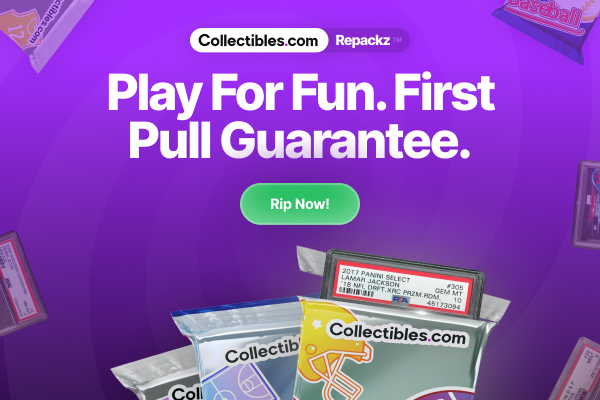
Law of Cards: Who, If Anyone, Owns Checklists?
Throughout the conversation over the Beckett v. Zistle checklist lawsuit, I’ve spotted an interesting issue repeatedly occurring on social media. I first saw it on Twitter"
 And then posted as a reply to the original Beckett v. Zistle article on Cardboard Connection…
And then posted as a reply to the original Beckett v. Zistle article on Cardboard Connection…
 Both of which raise a good question--who, if anyone, actually owns checklists?
Both of which raise a good question--who, if anyone, actually owns checklists?
To get the answer, we'll assume that checklists are copyright protectable (or at least contain some degree of protectability).
Legal aside: Whether or not checklists are protectable (and if they are, to what degree they are protectable) is debatable. However, with its lawsuit, Beckett holds itself out as a believer in the protectability of checklists, so we’ll go along with Beckett’s assumption.
Checklists are created as a summary of the cards within a trading card release, and they’re available from trading card manufacturers and/or third party sources. Trading card manufacturers (normally) make it easy by including checklists within (some of) their products or release them with marketing materials. There are likely no copyright infringement issues surrounding a trading card manufacturer creating a checklist of its own products.
Legal aside: If there were, that would make for a lawsuit whose caption could rival the Upper Deck v. Upper Deck saga.
Third parties also create their own checklists because they have recognized there is a value in creating and posting checklists. There are at least four ways third parties create checklists:
1) There’s the "copy the manufacturers' checklist way." Here, a third party just copies the content of a manufacturer's checklist.
2) There’s the "easy, I might not get caught way," of going to a third party’s website, copying that third party's checklist, and then changing it a little to "avoid" any claims of copyright infringement.
3) There’s the "lazy way," of going to a third party website, wholesale copying their checklist and, without modification, posting that as your own.
4) And finally, there’s the allegedly "most legit way." This is a time consuming method of purchasing boxes of trading cards, organizing them, and then self-generating a checklist.
Obviously there are more than four ways, and most third party checklists are created from some combination of one or more of the above, but for our purposes, this is a pretty complete list.
Now, can you predict which methodologies will expose a third party to no potential liability?
1) Starting with the "copy the manufacturers' way," and again with the assumption that all checklists are copyright protectable, is their copyright infringement?
Potentially. But there's likely an implied, if not express, license.
Most times, trading card companies prepare the first, original checklists. Because they are the checklists' authors, they are the copyright owners.
Copyright law not only gives copyright owners the right to prevent others from making copies, it also allows copyright owners to prevent others from making "derivative works."
The definition of "derivative works" is vague, but it's basically a second, later-created work that includes copyright-protected elements from a first work. A checklist then prepared by a third party source from the trading card manufacturers’ original checklist is potentially a derivative work. Therefore, if the third party had access to the trading card manufacturers’ checklist and did not have a license, that's technically infringement.
Although there might be infringement, this is not really a scenario anyone should worry about. The third party has a great argument that there's an implied (if not express) license to create derivative checklists since trading card manufacturers have been allowing third parties to generate and post checklists for years. So, yes, while there is potential infringement, there's also a great license defense.
Legal aside: There's also likely a fair use defense, but the fair use doctrine is complicated, inconsistently applied by courts, and worth multiple articles on its own.
2) For the "easy I might not get caught way," there’s a fun issue to deal with first – what does the third party checklist creator actually own? In all likelihood, that third party checklist creator only owns the selection and arrangement of the checklist (since a checklist at its basest level is simply a collection of "facts" and you can’t copyright facts) to the extent that the selection and arrangement is creatively original.
Legal translation: Simply organizing a list by card number does not show sufficient creativity. There needs to be more.
Also, since checklists are complete lists of all of the cards within a set, there is no "selection." So, to the extent there is protection, it focuses solely on the original/creative arrangement of that checklist. If a third party then "copies" the list, and changes it to remove all of the original/creative arrangement, then this copier is likely OK because he or she would have only copied "facts" (i.e., card number, player name, etc.) that are not protectable.
Keep in mind, however, to win a copyright lawsuit all a copyright owner needs to prove is (basically) 1) access to the original work and 2) copying of the original work’s protectable elements. This gives the copyright owner multiple things to prove (and thus, multiple ways to lose a case). Access is difficult to prove for most copyright cases. However, access for checklist cases is easier , especially if some of the "arrangement" was copied.
Legal translation: "He used the same font, color and spacing! And we'll have a mathematician testify that the random chance of that occurring is 1 to 1,000,000,000!"
So, while you’re likely in a good position on the "copying of protectable elements" requirement (since your checklist only shows the facts you copied), you’re not in the best position for the "access" element since you did "access" the third party’s checklist.
3) The "lazy way" is the riskiest for the copier. Since the checklist was copied wholesale, it's hard to say there was no "access" or "copying" because the copier's list is identical. The sole focus of this case will then be on whether or not the arrangement of the checklist was truly protectable, which would need to be determined by a judge or jury. It's an open issue, and thus risky for both sides to go to trial. However, it is the best position for a copyright owner because he or she only has one issue to argue.
And a plaintiff who only has to prove one thing is a happy plaintiff.
4) This leaves us with the "most legit way," which has to be legal, right?
A few years ago I would have said definitely. And I'm still confident it is, but a Harry Potter case throws a wrinkle into the mix. In 2008, J.K. Rowling and Warner Brothers won a copyright lawsuit to stop the publication of a Harry Potter Lexicon by a third party. The Harry Potter Lexicon was to be an online guide for the Harry Potter universe, but it was not authorized/licensed by J.K. Rowling or Warner Brothers. At trial, the court found that the Lexicon borrowed too much protectable work, therefore there was no fair use defense and it infringed.
In my mind checklists don't rise to the level of an unlicensed compendium of an author's created universe, but the argument is there. The trading card manufacturers created the "universe" of trading cards for each set. Therefore, they should have the right to create derivative checklists.
I’ll give you, this is reach (especially since trading card manufacturers have allowed this practice for years) but, it's theoretically a valid argument. And it only takes one crazy client/lawyer to raise it.
Legal aside: And if you've read this column before, you recognize that there are a couple of those in the trading card industry.
Where does this leave us? Basically, if checklists stick with the facts, they are likely OK.
But to address the over-riding social media concern, trading card manufacturers should make a statement. Right now, third parties are litigating about who owns lists of items they "don’t own and didn’t create." It would be great if the actual creators of those items would tell the industry that because they treat checklists of their items as "public domain," then checklists should be free for everyone. And if someone starts bullying others on lists of items "they don’t own and didn’t create," maybe trading card manufacturers should push back because, really, checklists are derivative works of their original checklists.
This would provide needed clarity for the industry. And if it lead to more lawsuits, more fun articles to write.
The information provided in Paul Lesko's “Law of Cards" column is not intended to be legal advice, but merely conveys general information related to legal issues commonly encountered in the sports trading card industry. This information is not intended to create any legal relationship between Paul Lesko, Simmons Hanly Conroy or any attorney and the user. Neither the transmission nor receipt of these website materials will create an attorney-client relationship between the author and the readers.
The views expressed in the “Law of Cards" column are solely those of the author and are not affiliated with Simmons Hanly Conroy. You should not act or rely on any information in the “Law of Cards" column without seeking the advice of an attorney. The determination of whether you need legal services and your choice of a lawyer are very important matters that should not be based on websites or advertisements.
 | Making purchases through affiliate links can earn the site a commission |

































Scott
I’m not sure of the motivation behind Beckett’s lawsuits recently. If it is to protect their checklists that seems to be farcical. Until you actually think about it. When one of the major reasons people use Beckett products (Magazine purchases, website subscriptions etc.) is for access to checklists. You can see how they would want to protect it.
When other sites offer what Beckett offers, but offers it for free, then you can see how these sites will affect Beckett’s bottom line.
Beckett is a business after all. People used to look on Beckett as a hobby staple, well at least I did, my budget always included money to buy Beckett’s magazines. I thought of them as a companion, some one like me, who enjoyed collecting cards, and decided to help out collectors with useful information. Beckett was one of the guys, so to speak. it was how the magazines, at least in the early years portrayed themselves.
After Beckett was sold, or became more corporate, that changed, at least in this man’s humble opinion.
If Beckett wants to be looked on as one of the guys, or a companion to the hobby, an information source that helps collectors, then it should, instead of suing others hobbyists, take a leadership role in the hobby, by letting everyone have access to all the checklists with no reservations.
All checklists essentially are just the cataloging of cards. Beckett uses and used a catalog itself as a reference when they organized their cards. When they speak of T206 cards they did not invent the designation. So when others organize their collections using Beckett checklists, they are just doing what Beckett did in its early days. That catalog (The American Card catalog) has become passe but still remnants are around from it to this day. Beckett should think of itself as an access catalog gifted to the hobby as they once thought of the ACC.
If Beckett cared about accuracy in card cataloging available to the public, then allowing others to use their checklist would reduce confusion. It would become easier to standardize card lists so there isn’t 20 different designations for the exact same card. In all cataloging practices, it is accuracy and standardization that is the most important, not checklist protection.
Suing others for using their checklists, if you can even call checklists of third party products theirs, just comes off as bullying at least in my opinion, and has cost them monetarily from this collector. I don’t subscribe to Beckett because of it.
Beckett was once the main source of hobby information, and pricing was the biggest part of it, the checklists just organized the cards so the pricing could be found more easily, now that eBay exists and pricing can be found without delay, Beckett’s pricing is mostly irrelevant, perhaps protecting the checklists is Beckett’s way of trying to hold on to at least part of what once made them great.